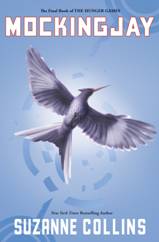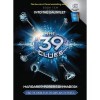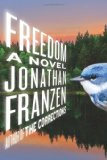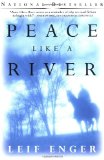 This has been a big month for hype in the publishing industry. In fact, I’m a part of the hype — running an awesome Mockingjay Ipod Touch giveaway and a 39 Clues contest over at 5 Minutes for Mom in honor of these very anticipated books that concluded a popular YA series and a much-read middle-grade series.
This has been a big month for hype in the publishing industry. In fact, I’m a part of the hype — running an awesome Mockingjay Ipod Touch giveaway and a 39 Clues contest over at 5 Minutes for Mom in honor of these very anticipated books that concluded a popular YA series and a much-read middle-grade series.
As a result of the hype, I actually read the first 39 Clues book, and I was pleasantly surprised. I assumed because they were so short, and colorful, and popular that they weren’t necessarily any good. I was wrong (follow the link for my review).

And just today I posted my review of Jonathan Franzen’s Freedom. I was offered a review copy, and the length and subject matter gave me a little pause. But all I could think of was the hype. I thought that we should review it here — to confirm or contradict all the hype — and so I decided to give it a try (follow the link to my review and you’ll see that I’m really glad I did).
 Hype can hurt a book. I don’t know anything about Johnathan Franzen. I don’t know if he’s THE writer best equipped to represent what live in the 21st century is like. I don’t know if he deserves to be on the cover of Time magazine. I don’t know why guys like him get fawned over when completely wonderful writers who happen to be women who happen to write about women’s issues feel like they get passed over critically.
Hype can hurt a book. I don’t know anything about Johnathan Franzen. I don’t know if he’s THE writer best equipped to represent what live in the 21st century is like. I don’t know if he deserves to be on the cover of Time magazine. I don’t know why guys like him get fawned over when completely wonderful writers who happen to be women who happen to write about women’s issues feel like they get passed over critically.
But I know that the hype was the reason that I requested the audiobook. I know that I ended up enjoying — really enjoying — the book, even listening with a critical ear and the mindset of “Prove that this book is worth the hype.”
There are other times I stay away from hype. I was in a neighborhood book club back in the late 90’s. It was that kind of book club, the kind where many of the women didn’t read the book, and even when they did, the discussions never went much further than “I liked it,” or “I didn’t really like it,” or “It would make a good movie.” We read a lot of Oprah books from that era: The Pilot’s Wife, Tara Road and Jewel were a few I remember. After reading a few more of her picks (and seeing the hype that a nod from Ms. Winfrey can give a book), I realized that I didn’t care what kind of books she wanted me to read. They were generally stories about a woman who bucked convention and/or got out from under the yoke of evil oppressive men. . . . but I digress.
 Hype has hindered my enjoyment of a few other books (or maybe I wouldn’t have liked them anyway). Literary housewife types love Gilead by Marilynn Robinson, but all of those people also love To Kill a Mockingbird and Peace Like a River, so I sort of stayed away, because when I read Peace Like a River, I was waiting to be wowed, and I just wasn’t. Don’t get me wrong, and don’t go saying that I think that TKAM is overhyped, but for me — I just didn’t get it. It’s a nice story. A bit barrier-breaking for its time, I suppose, but reading it in the 21st century doesn’t feel so revolutionary. The first time I read The Lion, the Witch and the Wardrobe, for a Children’s Literature class I too in college, I have to admit I felt the same way. Everyone said how symbolic it was, and again, though it was a good story, I missed it the life-changing symbolism of a Christian life.
Hype has hindered my enjoyment of a few other books (or maybe I wouldn’t have liked them anyway). Literary housewife types love Gilead by Marilynn Robinson, but all of those people also love To Kill a Mockingbird and Peace Like a River, so I sort of stayed away, because when I read Peace Like a River, I was waiting to be wowed, and I just wasn’t. Don’t get me wrong, and don’t go saying that I think that TKAM is overhyped, but for me — I just didn’t get it. It’s a nice story. A bit barrier-breaking for its time, I suppose, but reading it in the 21st century doesn’t feel so revolutionary. The first time I read The Lion, the Witch and the Wardrobe, for a Children’s Literature class I too in college, I have to admit I felt the same way. Everyone said how symbolic it was, and again, though it was a good story, I missed it the life-changing symbolism of a Christian life.
I know I’m making some enemies here, and feel free to jump in and respectfully disagree with me in the comments.
To get back to the point, hype has maybe ruined some books for me, but as I found out this month, it also has served to introduce me to others that I might otherwise have missed.
How does hype affect what you read and how you feel about it? When has hype helped you find a book? When has it hindered your view of it?
Subscribe to our feed. Follow us @5M4B on Twitter. Check out our current giveaways.
I totally understand what you’re saying. I think hype is the reason I’ve avoided The Hunger Games trilogy. I’m sure I’ll read it at some point, but I’m waiting for the hype to die down.
Yes, old hype doesn’t hold the power that current hype does.
I remember I read Anita Diamont’s The Red Tent about 5 years after it was all the rage. I felt like I could make a better decision that way.
I’ve been really interested in the Franzen-hype, especially with Weiner and Picoult’s commments and the follow-up news stories. I can’t help but feel that female authors who write female-centric novels about the realism of raising children, sustaining a marriage and all the other subjects we can relate to, are rarely viewed as “universal” writers, but simply writing for “chicks.” Humph.
I think that Weiner and Picoult’s comments fueled the hype — WERE part of the hype. I know that they were just using him as an example, but they hadn’t read it.
But I do agree that women authors writing about the same type of stuff that Franzen covered in Freedom — would be classified as “women’s fiction.”
And I don’t know about you, but men write differently — I never connect to man writing the same types of stories as I do with women.
Interesting on your last point. The first and foremost exception that comes to mind is Wally Lamb– I’ve been consistently impressed with his ability to write convincingly in both male and female protagonists’ voices. She’s Come Undone was amazing- and I had to keep looking at his picture on the back cover to remind myself that it was NOT written by a woman!
Liz Burns @LizB) was all hyped out on twitter because of a NYT article that was amazed that Franzen could write so well for a woman — because it made it seem as if men and women don’t live in the same universe.
Franzen did write women well, but he still wrote like a man if that makes sense. But I did tell you when we were discussing TTTW that I think that Niffenegger sort of writes like a man from that standpoint.
Huh- I guess I never thought about that with Niffenegger…
I don’t like reading books that are currently popular. I’m not sure why. Partly because I assume they aren’t any good and partly because I don’t want to go along with the crowd, I guess.
But I do have the same thing of saying “prove me wrong” while reading a popular book. Even when I read The Hunger Games series I was saying that, and I ended up not loving them. But I don’t think that was because they are the hype; it was just me. 🙂
I think people are quick to join in on the hype without knowing what they are talking about. And you also have to look at who is saying the books are the greatest, too. Sorry, but I’m not just going to read a book because Oprah said I should. 🙂
Yep, and yep, and yep.
I felt it was my “professional duty” to find out about Freedom — ha ha ha. But I do think that I am more likely NOT to like a hyped book than like it (especially if I read it in the midst of the hype).
I read everything so if I hear about it I read it. So, hype does not really matter to me but if there is sufficient hype I will probably hear about it and therefor I will read it.
If we really only could read everything we hear about. . . . Only so much time in a day!!
I read a few Oprah picks in the 90s as well and got tired of the poor, depressed, usually abused female protagonists whose lives just never got better. I’m more likely to not a read a book she hypes just because she hypes it.
One effect hype has on me is I am more likely to violate my 50 page rule if the book has hype. And I often find myself wishing I’d stuck to the rule.
I just try to stick to my first instinct. If I read about a book and think I won’t like it, but then start seeing it everywhere, I just have to remember that my first instinct was probably right. But if I think I might like a book, then the more hype it gets, the more I want to read it.
You’re right about the gut instinct. Sometimes I avoid a book b/c of the hype, and when I love it, I wish I would have ignored the hype and just gone with my gut!
Hype tends to turn me off. Things so rarely live up to it. Movies, books, etc.